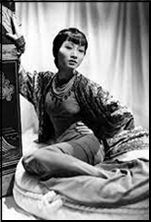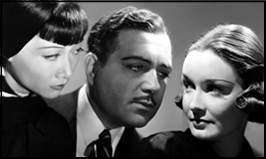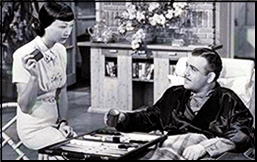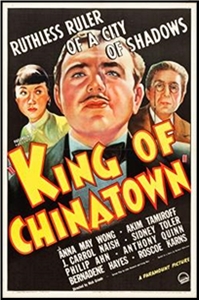Thu 4 May 2023
Movie Reviews by David Vineyard: DANGEROUS TO KNOW (1938) and KING OF CHINATOWN (1939).
Posted by Steve under Action Adventure movies , Reviews[10] Comments

DANGEROUS TO KNOW. Paramount Pictures, 1938. Akim Tamiroff, Anna May Wong, Gail Patrick, Lloyd Nolan, Anthony Quinn, Roscoe Karns, Harvey Stephens, Hedda Hopper, Porter Hall. Screenplay: Harold Lipman & Horace McCoy, based on the novel and play On the Spot by Edgar Wallace. Song “Thanks for the Memory.†Directed by Robert Florey.
KING OF CHINATOWN. Paramount Pictures, 1939. Akim Tamiroff, Anna May Wong, J. Carroll Naish, Philip Ahn, Anthony Quinn, Sydney Toler, Roscoe Karns. Screenplay: Irving Reis & Leland Hayward. Directed by Nick Grinde.
Two films teaming Akim Tamiroff as a gangster with Anna Mae Wong, both giving strong performances in above average B-films, both co-starring a young Anthony Quinn. Of the two Dangerous to Know is the better film, though Wong has a bigger role, though not as showy, in King of Chinatown.
In the former,Tamiroff is Stephen Recka, who runs the town, but would rather be accepted by society and appreciate his music with his “hostess†Lan Ling (Wong) who loves him despite his neglect. As the film opens, Recka has been double-crossed by an associate and arranges with his right handed man (Quinn) to cause an “accident.â€
But Recka has met beautiful society woman Margaret Van Case (Gail Patrick) and decides he wants her. She’s in love with young Philip Easton (Harvey Stephens) though, and Recka has to get rid of him first, which he does by getting Easton a job with a bank and then setting him up for the theft of bonds and kidnapping him.

Meanwhile things quickly complicate when Tamiroff discovers the two thugs he hired to set Easton up have taken off with the bonds and been picked up by the police putting his old rival Inspector Brandon (Lloyd Nolan, making the most of a fairly small role in one of several films he did with Tamiroff) on his trail.
Margaret comes to Recka to get help for Easton who has been arrested on a tip from Recka who left him drunk in a hotel room. Brandon further messes up Recka’s plans by not charging Easton, but Margaret agrees to marry Recka if he saves Easton.
Coincidence runs rampant toward the end, but Wong gets to shine in a scene when she says her goodbye to Recka, which, while high melodrama is effective, and the thing gets wrapped up neatly in just under an hour, replete with the debut of Bob Hope’s theme song “Thanks for the Memory.â€

No one can say you didn’t get your quarter’s worth with a B and a feature plus newsreels, shorts, and cartoons.
With an Edgar Wallace novel and play (Wong played the lead on Broadway with Glenda Farrell), a screenplay by Lipman and McCoy and always interesting direction by Florey, it is all much more than you have the right to expect from a B-movie.
Wong has a much bigger role in King of Chinatown, where she is a brilliant surgeon, Dr. Ling, whose father, also Dr. Ling (Sydney Toler, in a debut of his Charlie Chan persona after he was cast, but before his first film was released) is resisting efforts of nightclub owner and self styled king of Chinatown, Baturin (Tamiroff).
Ling and her boyfriend reporter Bob Lee (Philip Ahn in a rare leading man role) are witnesses when Baturin is wounded in a plot by his ex-murderer business manager the Professor (J. Carroll Naish) and an ambitious hood (Anthony Quinn) and thinking her father shot him try to keep him from talking.
Ling operates on Baturin and keeps him isolated. and later takes a job caring for him in his home, where Baturin starts to fall for her. In the meantime, the police are starting to move in on the Professor and Quinn as the Professor decides to silence Baturin before he can come back and see what they have done in Chinatown.

In the end with the money from Baturin, Wong and Ahn fly off to China with money to help with medical aid for the on going war with Japan.
There is no big scene for Wong in this, though she is on screen much more of the time, and despite her strong presence, both films are much more showcases for Tamiroff, who starred in a number of strong B films in the period. The notable thing about both films is they are far better and more ambitious than they had to be and have fairly notable screen credits (Lipman, McCoy, Hayward, Reis).
It’s also notable how many familiar faces wander in and out of these, with actors like Porter Hall and Roscoe Karns on hand for little more than walk-ons.

May 4th, 2023 at 7:42 pm
DANGEROUS TO KNOW has been reviewed twice before on this blog:
By Dan Stumpf:
https://mysteryfile.com/blog/?p=23782
and by Walter Albert:
https://mysteryfile.com/blog/?p=52652
May 4th, 2023 at 8:18 pm
Armenian born Russian named Tamiroff (Hovakim Tamiryants) was still going strong playing roughly the same kind of roles in films like OCEAN’S ELEVEN, TOPKAPI, and THE LIQUIDATOR in the Sixties. His last American film was 1969’s THE GREAT BANK ROBBERY with Zero Mostel and his last film the unfinished DON QUIXOTE (1972).
He was nominated for best supporting actor for THE GENERAL DIED AT DAWN and FOR WHOM THE BELL TOLLS.
May 4th, 2023 at 9:58 pm
It should be noted that Barbie introduced an Anna May Wong doll this past Monday. I doubt an Akim Tamiroff doll will coming any time soon, though.
May 4th, 2023 at 11:45 pm
Akim Tamiroff as a young man, was certainly a handsome and rakish-looking devil. I applaud him and I hope he enjoyed every minute of his career.
May 4th, 2023 at 11:53 pm
ps. who could forget Porter Hall.
“Mister Boot, you strike me as a careful man”
–Chuck Tatum, ‘Ace in the Hole’
May 5th, 2023 at 7:41 am
The Paramount Bs in that series were consistently classy, with fast-paced scripts, lush photography and memorable casts. I catch one whenever I can.
May 5th, 2023 at 7:13 pm
Jerry House, I want the Tamiroff action figure as Pablo from FOR WHOM THE BELL TOLLS.
Seriously, fitting tribute to Wong who became a major star at a time Asian women in films were almost exclusively played by white actresses.
Her big scene in DANGEROUS TO KNOW is pure melodrama, but I would have loved to see her do it live on stage. It’s a kind of bravado acting style we don’t see too often these days, which is largely true of Tamiroff too.
Considering his roles in these films with Tamiroff I wonder now if when Quinn was older and playing these broad character type roles (albeit as the leading man) he drew on Tamiroff.
May 5th, 2023 at 8:53 pm
Fun Fact: this Gail Patrick went on to be the Executive Producer of the original 9-year-run of TV’s ‘Perry Mason’ show, as Gail Patrick Jackson.
May 6th, 2023 at 11:33 pm
Both of these titles are in the new Anna May Wong box set just released by Kino Lorber.
https://kinolorber.com/product/anna-may-wong-collection-dangerous-to-know-island-of-lost-men-king-of-chinatown
May 7th, 2023 at 9:00 am
Amazing! Pure synchronicity?
Anna May Wong Collection [Dangerous to Know / Island of Lost Men / King of Chinatown] (Blu-ray)
Thanks, Des!